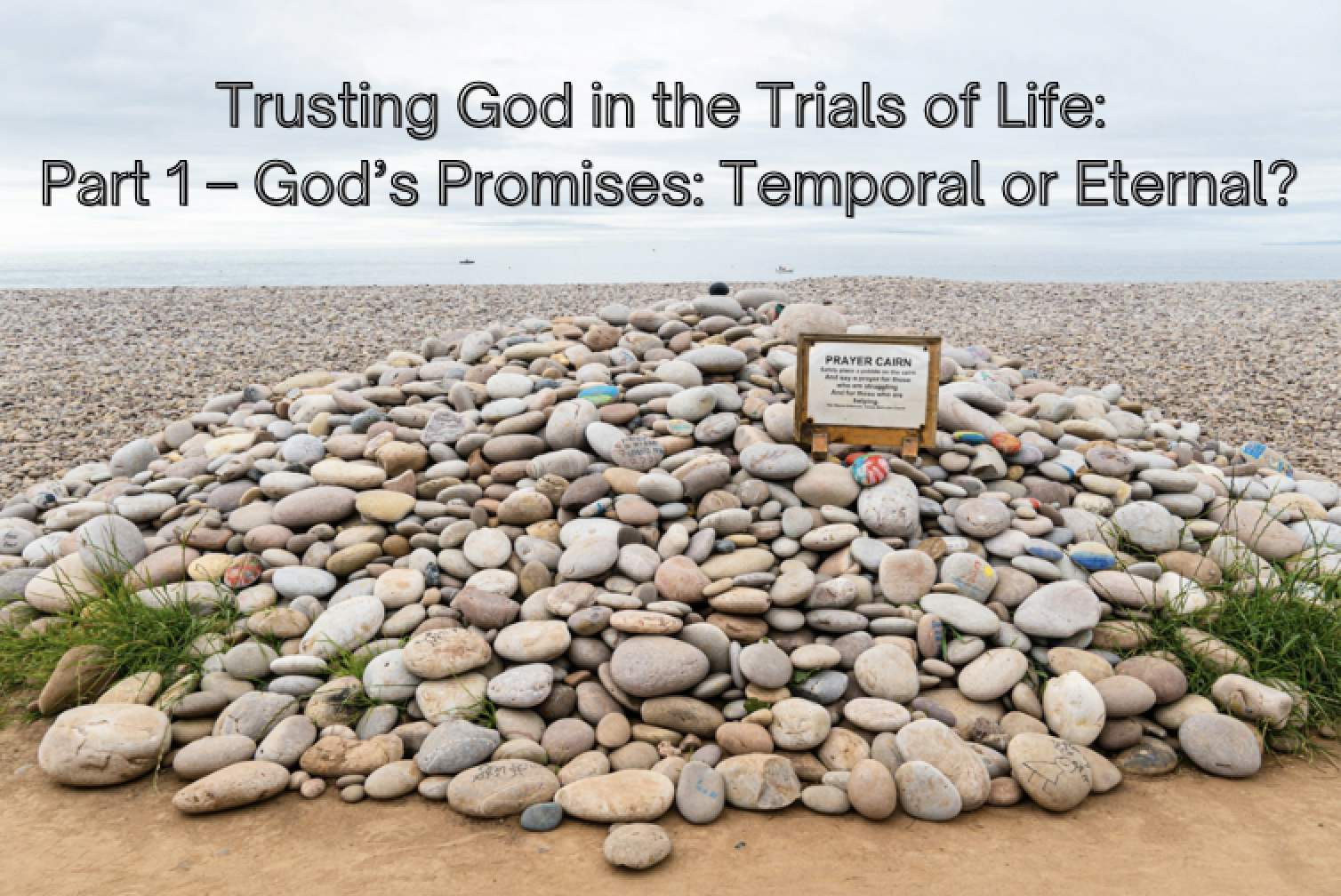Trusting God in the Trials of Life: Part 1 – God’s Promises: Temporal or Eternal?
In times of uncertainty, one of the greatest challenges for believers is trusting in God’s promises. We hold tightly to verses that speak of His provision and faithfulness, yet circumstances can leave us wondering: Is God truly meeting my needs? To answer this, we must first understand the scope and nature of His promises. Are they meant to secure our temporal comfort, or do they point us toward eternal hope?
The Scope of God’s Promises
God’s promises are both expansive and precise, addressing every need we could ever encounter. Philippians 4:19 assures us:
“And my God will supply every need of yours according to His riches in glory in Christ Jesus.”
Notice the careful phrasing: God promises to meet every need, not every desire. From His infinite perspective, God defines our needs not by what makes us comfortable, but by what conforms us to Christ (Romans 8:29). Sometimes, this means providing immediate relief; other times, it means allowing a trial to deepen our dependence on Him.
Temporal Needs vs. Eternal Hope
In Matthew 6:25-34, Jesus instructs His followers not to worry about daily provisions like food, drink, or clothing. Instead, He calls us to “seek first the kingdom of God and His righteousness, and all these things will be added to you” (v. 33). This teaching doesn’t negate God’s care for our physical needs; it simply places them within a larger framework.
Temporal blessings, while meaningful, are secondary to the eternal hope we have in Christ. Paul captures this beautifully in 2 Corinthians 4:17-18:
“For this light momentary affliction is preparing for us an eternal weight of glory beyond all comparison, as we look not to the things that are seen but to the things that are unseen. For the things that are seen are transient, but the things that are unseen are eternal.”
God’s promises are as much about shaping our character as they are about meeting our needs. By lifting our eyes from the temporal to the eternal, we can trust Him even when circumstances seem bleak.
Redefining "Needs" Through a Biblical Lens
One of the keys to trusting God’s promises is redefining our understanding of "needs." In Western culture, we often conflate needs with wants, viewing things like financial security, comfort, or career success as necessities. Yet, the Bible shifts our focus to spiritual needs:
The need for God’s grace and forgiveness (Ephesians 2:8-9).
The need for His Spirit to guide and empower us (John 14:26).
The need for His Word to nourish and sustain us (Matthew 4:4).
When we align our perspective with God’s, we see His provision in ways we might have overlooked.
Trusting God’s Character Amid Unmet Promises
What happens when God’s promises seem unmet? This is where faith steps in—not blind optimism, but a confident trust in His character. God’s faithfulness is not contingent on our circumstances; it is rooted in His unchanging nature (Hebrews 13:8). He sees what we cannot and works all things together for the good of those who love Him (Romans 8:28).
Take heart: God’s promises are often fulfilled in ways we least expect. The Israelites wandered in the wilderness for 40 years, yet God provided manna daily. Paul endured thorny trials, yet he testified that God’s grace was sufficient (2 Corinthians 12:9). In every story, God’s faithfulness shines.
Practical Application: Surrendering Our Unmet Needs
To apply these truths, consider this exercise:
Write Down Your Perceived Unmet Needs
Take a moment to list the areas where you feel God’s promises have not been fulfilled. Be honest—this is a safe space for vulnerability.Prayerfully Surrender Them to God
Bring your list before Him in prayer. Ask for His perspective, trusting that His definition of your needs is perfect.Reflect on His Past Faithfulness
Revisit times when God provided in unexpected ways. Allow these memories to strengthen your faith for the present.
Closing Thoughts
Understanding God’s promises is not about diminishing their beauty but about seeing them in their full scope. He is a God who provides abundantly—both for our temporal needs and our eternal joy. By shifting our focus from earthly outcomes to His eternal purposes, we can rest in the assurance that He is faithful.
Reflection Verse
“Trust in the Lord with all your heart, and lean not on your own understanding; in all your ways acknowledge Him, and He shall direct your paths.” (Proverbs 3:5-6)
Join us next time as we explore what it means to trust God when His will is different from our own. Until then, may you rest in His promises, knowing they are as unshakable as He is.
